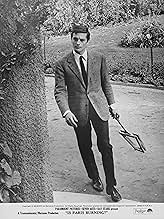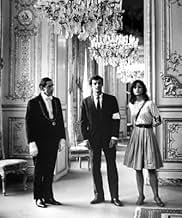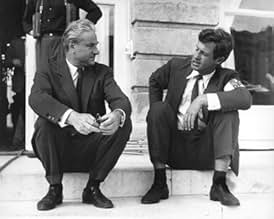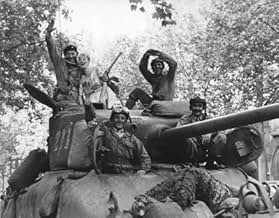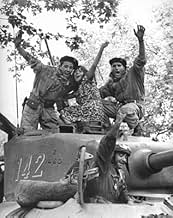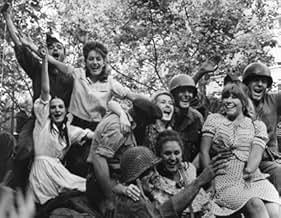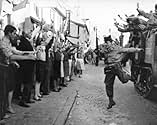AVALIAÇÃO DA IMDb
6,8/10
5,4 mil
SUA AVALIAÇÃO
A saída do exército alemão de Paris em 1944.A saída do exército alemão de Paris em 1944.A saída do exército alemão de Paris em 1944.
- Direção
- Roteiristas
- Artistas
- Indicado a 2 Oscars
- 4 indicações no total
George Chakiris
- GI in Tank
- (as Georges Chakiris)
Gert Fröbe
- General Dietrich von Choltitz
- (as Gert Froebe)
Avaliações em destaque
This is a good movie, but only if you have read the book. Otherwise, it would appear to be muddled and difficult to follow. There were so many different resistance factions operating in Paris at the time of the liberation it is difficult to keep them straight. The movie doesn't help you in that regard. Reading the book gives you a much better perspective on the part each faction played in the liberation.
The little vignettes you see with characters appearing in the film for only a few minutes are all true. Unfortunately, they don't always make sense to an uninformed viewer and they give the viewer the sense of a badly edited film.
The true story of the last few days before the liberation is extremely remarkable. Hitler sent a hard core general he trusted to destroy Paris. It is incredible that he disobeyed orders and saved the city.
What I really loved about the movie was the city itself. It is one of the most beautiful cities in the world. The film was shot mostly in the actual locations where the events portrayed took place. As a lover of history, I have been fortunate to have visited Paris more than once and walked these locations fully aware of what happened there. That makes this movie special for me. But, the film does have problems.
Besides being a bit disjointed, the French and German dialog were dubbed in English. It would have been better with subtitles, although many of the same actors did their own English dubbing. The film is in black and white, which doesn't bother me, but it might have been better in color. One of the main reasons for B&W was the Nazi flags. The French authorities refused to allow red and black Nazi flags to fly in Paris, even for a movie. They agreed only to have black and gray flags. But the black and white filming also allowed the blending of authentic war footage with the movie. Also remember that another similar film, The Longest Day, was shot a couple of years earlier in B&W.
The film is filled with a small army of great international actors. That was fun, although I didn't buy Kirk Douglas as General Patton. Gert Frobe (Goldfinger) was excellent as the German general in charge of Paris and Charles Boyer was also excellent in his small role. The music was composed by Maurice Jarre and is just wonderful. Whenever I am in Paris, the music continually runs through my head. As a side note, Jarre obviously borrowed much of this soundtrack for use in "Grand Prix".
In short, this is a historical movie rather than a great film. I recommend you read the book to get the full impact of the movie. But understand this remarkable story of the liberation is stranger than fiction, which makes it a good read. And, if you ever visit Paris the movie will take on a whole new perspective.
The little vignettes you see with characters appearing in the film for only a few minutes are all true. Unfortunately, they don't always make sense to an uninformed viewer and they give the viewer the sense of a badly edited film.
The true story of the last few days before the liberation is extremely remarkable. Hitler sent a hard core general he trusted to destroy Paris. It is incredible that he disobeyed orders and saved the city.
What I really loved about the movie was the city itself. It is one of the most beautiful cities in the world. The film was shot mostly in the actual locations where the events portrayed took place. As a lover of history, I have been fortunate to have visited Paris more than once and walked these locations fully aware of what happened there. That makes this movie special for me. But, the film does have problems.
Besides being a bit disjointed, the French and German dialog were dubbed in English. It would have been better with subtitles, although many of the same actors did their own English dubbing. The film is in black and white, which doesn't bother me, but it might have been better in color. One of the main reasons for B&W was the Nazi flags. The French authorities refused to allow red and black Nazi flags to fly in Paris, even for a movie. They agreed only to have black and gray flags. But the black and white filming also allowed the blending of authentic war footage with the movie. Also remember that another similar film, The Longest Day, was shot a couple of years earlier in B&W.
The film is filled with a small army of great international actors. That was fun, although I didn't buy Kirk Douglas as General Patton. Gert Frobe (Goldfinger) was excellent as the German general in charge of Paris and Charles Boyer was also excellent in his small role. The music was composed by Maurice Jarre and is just wonderful. Whenever I am in Paris, the music continually runs through my head. As a side note, Jarre obviously borrowed much of this soundtrack for use in "Grand Prix".
In short, this is a historical movie rather than a great film. I recommend you read the book to get the full impact of the movie. But understand this remarkable story of the liberation is stranger than fiction, which makes it a good read. And, if you ever visit Paris the movie will take on a whole new perspective.
Although Hitler somehow survived the failed July assassination attempt his paranoia increased. One of the few high-ranking officers he felt he could still trust was Dietrich von Choltitz. He had served Hitler well and was an officer who could be relied upon to obey orders implicitly. Hitler appointed him Governor-General of Paris with instructions to restore order and if need be destroy Paris rather than let it fall into Allied hands. Every bridge and monument was mined. This and the general insurrection led by the French Communist Party combined to make this a momentous and perilous time in the history of the French capital. As the Allies approached, von Choltitz rescinded Hitler's order. Seventy-five years on it is almost impossible to appreciate just how close Paris came to total destuction.
These events should, in theory anyway, provide sufficient material for a first-class movie, especially with René Clément at the helm.
In reality alas the film is a dud. One can try and find reasons. Personally I think it is down to a variety of factors: at a little under three hours it rambles; the newsreel footage is far more interesting and thrilling than the filmed action; there is an irritating mish mash of accents with some decidedly dodgy dubbing; there are too many writers and far too many famous faces. One critic at the time observed that the flames were extinguished by the shower of stars! The performance that stands out is that of Orson Welles as Swedish Consul Raoul Nordling, an unsung hero whose diplomatic relationship with von Choltitz assuredly influenced the latter's thinking. This relationship is very well depicted in Volker Schloendorff's film 'Diplomacy' with Niels Arestrup and Andre Dussollier as General and Consul.
The scene that really packs a punch is the sight and sound of the bell of Notre Dame which had been silenced for over four years. This is especially poignant in light of the recent fire that engulfed this monumental edifice. Clement has also included a rendition of 'La Marseillaise' which never fails to move. Needless to say the film was a tremendous success in France and Maurice Jarre's rather hurdy-gurdy 'Paris Waltz' theme extremely popular in its own right. Big budget plus well known actors equals great film? In this case decidedly not. Strange indeed that 'The Longest Day' which had no less than five directors, seems to work better than this with just the one. The real star of course is Paris itself.
These events should, in theory anyway, provide sufficient material for a first-class movie, especially with René Clément at the helm.
In reality alas the film is a dud. One can try and find reasons. Personally I think it is down to a variety of factors: at a little under three hours it rambles; the newsreel footage is far more interesting and thrilling than the filmed action; there is an irritating mish mash of accents with some decidedly dodgy dubbing; there are too many writers and far too many famous faces. One critic at the time observed that the flames were extinguished by the shower of stars! The performance that stands out is that of Orson Welles as Swedish Consul Raoul Nordling, an unsung hero whose diplomatic relationship with von Choltitz assuredly influenced the latter's thinking. This relationship is very well depicted in Volker Schloendorff's film 'Diplomacy' with Niels Arestrup and Andre Dussollier as General and Consul.
The scene that really packs a punch is the sight and sound of the bell of Notre Dame which had been silenced for over four years. This is especially poignant in light of the recent fire that engulfed this monumental edifice. Clement has also included a rendition of 'La Marseillaise' which never fails to move. Needless to say the film was a tremendous success in France and Maurice Jarre's rather hurdy-gurdy 'Paris Waltz' theme extremely popular in its own right. Big budget plus well known actors equals great film? In this case decidedly not. Strange indeed that 'The Longest Day' which had no less than five directors, seems to work better than this with just the one. The real star of course is Paris itself.
Do not listen to the naysayers. There is nothing confusing about this movie, unless you got into it thinking it would be MISSING IN ACTION part 17. The cast is stellar and the performances are solid. It mixed real-life documentary footage with staged performances, giving it a very realistic feeling. If you loved THE LONGEST DAY, you will love this movie. Highly recommended.
The film concerns about the Allies advance on Paris during WWII, in a remarkable act of courage, several French Resistance groups(Bruno Cremer,Alain Delon,Jean Paul Belmondo,Georges Geret,Bernard Fresson, among others) confront to regain Paris from the Nazis, who rule tyrannically the city and detailing the last days before the liberation. The German general in charge Von Choltitz (Get Froebe) is under direct orders from Hitler to destroy Paris, rather than left to the Allied, commanded by general Omar Bradley(Glenn Ford) and general Patton(Kirk Douglas) . But the Resistance fighters eventually take over Paris and Van Choltitz decides not to burn the city but to let intact to the liberators , as he thought which destroying it no useful for the future like a mankind legacy.
This is a spectacular pseudo-documentary style developing the liberation of Paris with the Resistance factions and tryings to burn the city by Nazy hierarchy . It's a co-production French and Paramount US with a plethora of international actors, many of them playing cameos and prestigious intervention. Special mention to Bruno Cremer as Resistance chief , Orson Welles as Sweden consul and Leslie Caron as fighter wishing to free her husband. The short details-characters about Resistance leaders only for a minutes are based on the stories of real-life people. Appear historical characters well incarnated by famous players Omar Bradley(Glenn Ford),George Patton(Kirk Douglas) General Lecrec(Claude Rich), Von Choltitz(Get Froebe), among others. The title movie comes from the continuous phone calls realized by Hitler to Von Choltitz that always began with : It's Paris burning ?. The movie was filmed in atmospheric black and white which allow the edition adding actual-life footage but also the main reason was the German swastikas flags but the French Mayor rejected to let the black and red in Paris and they would agree sole to gray and black version of flag that looked real when shot.
The motion picture displays an interesting script by Gore Vidal and Francis Ford Coppola, based on Larry Collins and Dominic Pierre novel who give you a much better perspective about role each Resistance faction played in the Paris liberation. The picture was deservedly nominated to Academy Award for best Art Direction, and best cinematography by Marcel Grignon, though didn't achieve none. The movie is professionally directed by Rene Clement, though sometimes is confuse and contains some flaws.
This is a spectacular pseudo-documentary style developing the liberation of Paris with the Resistance factions and tryings to burn the city by Nazy hierarchy . It's a co-production French and Paramount US with a plethora of international actors, many of them playing cameos and prestigious intervention. Special mention to Bruno Cremer as Resistance chief , Orson Welles as Sweden consul and Leslie Caron as fighter wishing to free her husband. The short details-characters about Resistance leaders only for a minutes are based on the stories of real-life people. Appear historical characters well incarnated by famous players Omar Bradley(Glenn Ford),George Patton(Kirk Douglas) General Lecrec(Claude Rich), Von Choltitz(Get Froebe), among others. The title movie comes from the continuous phone calls realized by Hitler to Von Choltitz that always began with : It's Paris burning ?. The movie was filmed in atmospheric black and white which allow the edition adding actual-life footage but also the main reason was the German swastikas flags but the French Mayor rejected to let the black and red in Paris and they would agree sole to gray and black version of flag that looked real when shot.
The motion picture displays an interesting script by Gore Vidal and Francis Ford Coppola, based on Larry Collins and Dominic Pierre novel who give you a much better perspective about role each Resistance faction played in the Paris liberation. The picture was deservedly nominated to Academy Award for best Art Direction, and best cinematography by Marcel Grignon, though didn't achieve none. The movie is professionally directed by Rene Clement, though sometimes is confuse and contains some flaws.
This film is a very well done dramatisation of the account of the liberation of Paris in August of 1944.History buffs take note;notice the mascot names of the tanks in General Leclerc's Free French armoured division.Many had Spanish names such as "Madrid" "Teruel" & "Zaragosa" as these vehicles were manned by anti-Fascist Spanish refugee fighters who played a largely important yet mostly un-acknowledged part largely ignored by mainstream historians about the WW2 period.
Você sabia?
- CuriosidadesOne of the main reasons for the movie being filmed in black and white: the French authorities refused to allow red and black Nazi flags to fly in Paris, even for a movie. They agreed only to the use of black and gray Nazi flags.
- Erros de gravaçãoJudging by Choltitz's own memoirs ('Soldat enter Soldaten", 1951) there never was an order to deliberately destroy Paris or its monuments. The orders concerned laming industrial plants, blowing bridges, crushing uprisings, and defending the town as a fortress, accepting collateral damage. Choltitz later found out these orders were addressed to his superiors, not to him. He does mention Hitler asking "Is Paris burning?" but says he was informed of this by others, whose names he does not give.
- Citações
Lieutenant Henri Karcher: [over the phone to his father] Hello, Papa? This is Lieutenant Karcher. Your son. In spite of your pessimstic view of my military career, I'd like to announce I've just made some prisoners of the general in command of Paris at the Hotel Meurice. He surrendered to me. But I'm still very bad at drill.
- Cenas durante ou pós-créditosThe end credit sequence is in color.
- ConexõesFeatured in Magician: The Astonishing Life and Work of Orson Welles (2014)
Principais escolhas
Faça login para avaliar e ver a lista de recomendações personalizadas
- How long is Is Paris Burning??Fornecido pela Alexa
Detalhes
- Data de lançamento
- Países de origem
- Idiomas
- Também conhecido como
- Is Paris Burning?
- Locações de filme
- Rue de la Huchette, Paris 5, Paris, França(barricades)
- Empresas de produção
- Consulte mais créditos da empresa na IMDbPro
- Tempo de duração
- 2 h 55 min(175 min)
- Cor
- Proporção
- 2.35 : 1
Contribua para esta página
Sugerir uma alteração ou adicionar conteúdo ausente

![Assistir a Bande-annonce [OV]](https://m.media-amazon.com/images/M/MV5BOWYyYzkwZTEtOTI4YS00NzFjLWI0ZmYtM2E1N2RiYTk2ZmNkXkEyXkFqcGdeQXRyYW5zY29kZS13b3JrZmxvdw@@._V1_QL75_UX500_CR0)
